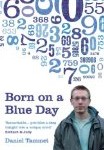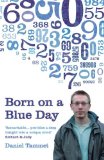Born on a Blue Day is the memoir of Daniel Tammet, a man who is probably unique in the world. Daniel not only has Savant Syndrome, a rare form of Asperger’s that produces amazing mental powers, but also synaesthesia, the ability to see numbers and words as specific colours and textures. This combination of conditions means that he is able to learn new languages in just a few weeks and they helped him to break a Guinness World Record by remembering Pi to 22,515 digits.
I found the whole book fascinating. Daniel explains exactly what he see and feels, giving the reader a good understanding of both Asperger’s and synaesthesia.
Thinking of calendars always makes me feel good, all those numbers and patterns in one place. Different days of the week elicit different colours and emotions in my head: Tuesdays are a warm colour while Thursdays are fuzzy.
It was particularly comforting for me to read about his early life, as my son (who has Asperger’s) exhibited many of the things he described (e.g. a constant need for rocking as in infant) which I haven’t seen in other books before.
After describing a difficult childhood, in which he felt isolated from his peers, Daniel describes how he found independence by taking a teaching job in Lithuania. He goes onto explain how he came to terms with his medical conditions and now helps scientists to try to understand differences in brain function.
I found the final section, in which he explains how he came to realise that he was gay and finally find love, particularly touching.
He isn’t the best writer in the world and his Asperger’s syndrome tends to mean he goes into unnecessary detail in some areas, but for the insight into this unique mind it is well worth putting up with less than perfect prose.
Recommended to everyone, but I think this is a ‘must read’ for anyone with an interest in Asperger’s or synaesthesia.


32 replies on “Born on a Blue Day – Daniel Tammet”
That’s about how I felt about this book. I really enjoyed it, particularly since I have syn myself (except I only have color –> grapheme syn).
Amanda, I knew that you had syn, but I didn’t realise there were different kinds. Now you mention it I guess I haven’t heard of the texture part before – I wonder if that is much rarer?
I thought this was an excellent book, too. He was on 20/20 or Dateline (one of those type shows anyway) a year or so ago. It was fascinating. They did an experiment with him. He had to learn the most difficult language in a ridiculously short amount of time and then be interviewed by a native speaking person. He passed with flying colors. Amazing to say the least!
Thoughts of Joy, There was a documentary in which they showed him learning Icelandic in just two weeks – I assume it is the same one? I haven’t seen it, but I really want to. I’m on the look out for it now 🙂
Yes, yes, yes! That’s it! Sorry, my memory isn’t remotely in the same ballpark as Daniel’s. :/
This is fascinating stuff. And I love personal stories of any kind. This guy definitely had his work cut out for him, not only feeling separated and isolated because of his gift, but also because he was gay. He is definitely to be applauded for being able to rise above it all and share it with us.
Sandy, He is an amazing man! It is so nice to see him thriving despite all the factors against him – he is such a positve role model. I really hope I get the chance to hear him talk at some point. I imagine he has loads of extra fascinating facts to tell us.
I ordered this book for my school’s library, got it and shelved it, then forgot about it. Thank you for reminding me of how good it is, I am going to add it to my TBR right now (and put it on display for the students to encourage them to read it)
Helen, I’m sure that you and your pupils will find a lot to enjoy/discuss in this book. You are in for a fascinating read 🙂
I’m adding this one to my TBR, thanks to you. I’ve been interested in reading more about Asperger’s syndrome, and just recently heard about synaesthesia but I didn’t know anyone had both.
Jeane, Great news! I don’t think very many people (if any!) have savant syndrome and syn – it is such a rare combination. I hope that you enjoy this book as much as I did.
I have this book and I found it very interesting. I did wonder whether he could have written this all by himself because he seemed to have a good understanding of the level of detail to write in – I didn’t find it too detailed, like you did. Also, understanding what exactly his audience might like to read about, could he really know this so well?
Anyway, a great book and definitely one to read if you have an interest in Aspergers.
Judith, Great point! I’d love to know how much (if any?) help he had writing this.
I suppose I didn’t get annoyed by the level of detail in the book – I just found it amusing. For example he talks about the 1988 Olympic games “with 8,465 participants from 159 countries.” He then goes on to talk about the how he catalogued all the race times, records broken, medals etc. I guess it just shows the aspects of his behaviour well, but it did lead to eye rolling on my part 😉
I really enjoyed this, not only because my son has Asperger’s, but because it’s a very honest account. Yes, Daniel has a very special talent but like anyone “different” and that can mean any one who doesn’t tick the boxes dictated by so called normality, he is in a constant battle between trying to fit in and being himself.
Aspies, whilst sometimes lacking empathy, are quite often more intelligent and insightful (perhaps not socially) than neurotypical folk. I know many people who have no connection with anyone with Aspergers who have really enjoyed this book as much as I have. Glad you enjoyed it too, Jackie. 🙂
Teresa, It is good to know that people without any link to either condition loved this book. I have given copies to most members of my family and I hope they get as much from it as I did.
I can vouch for Aspies being more intelligent than NTs – some of the suggestions my son makes are incredible. His novel way of thinking often amazes me. He is only 5 so I can only imagine what he’ll come up with when he is older 🙂
As long as your son has creative teachers he will be flying – others need to understand that there is more than one way of reaching the “right” answer. Luke does all his Maths mentally as it works much quicker and much more accurately for him. One teacher didn’t particularly appreciate his tendency not to show the working out … grr..the more education NTs have of autism the better as we could all afford to look at the world in a different way…rambling over for now! 🙂
Teresa, I think us parents do a lot of ranting 😉 I have met a few parents at various ASD support groups who moan about their children being told off for doing amazing feats of mental mathematics with no working 🙁 It is so sad they are punished for having these talents instead of celebrated. I guess I’ve got all this to look forward too….
Wow this sounds fascinating.
Brenna, I’m so pleased you think that 🙂
My knowledge of these ‘ailments’ are sketchy so this should be educative as well.
Mystica, Yes, this books is a good one to start with if you’d like to learn more. Enjoy!
This sounds like a really remarkable book! Definitely one I’d be interested in. I can’t fathom remembering Pi to so many digits! Wow…
Amy, I’d be lucky to remember 22 digits!!
I thought this book was so well done when I listened to it a few years back. Glad u liked it too!
I have this on my shelf. I’ve heard Tammet interviewed on the radio, and he’s a remarkable man. I must get around to reading the book soon. I have an intellectually disabled brother, so I know that anyone “different” often comes in for a lot of teasing and trouble at school, and can have difficulties in later life. I didn’t know you and Teresa have sons with Asperger’s. This book must have been of intense interest to you both. I’m really glad Daniel Tammet has told his story, because it may help others to understand.
I doubt this book will help people understand these conditions, most people are wilfully ignorant about people they deem different. Cynical? Yeah, suppose so but whatever.
I suppose that it stems from lack of immersion, most people are shown depictions of Asperger’s and autism from movies and tv and it’s a very slim view, with little basis in reality and it really amounts to little understanding. Until a person can be around someone with these conditions, day in day out you can’t really truly understand it because it doesn’t affect you.
Damned Conjuror, have you actually read this book?
no but i think my point still stands
I think we can’t expect everyone to be fully conversant with every disability known to mankind be they physical or mental (it would be physically impossible to do so) but I do believe that honest accounts of one person’s experience of a disability at least help to enlighten others and as a result show some empathy. I can’t afford to be cynical as I’d be giving up on thinking my son would have a rewarding life and I don’t think I’m being unrealistic either – I aim for the middle path! 😉
[…] ~ Born on a Blue Day by Daniel Tammet, reviewed by Jackie at Farm Lane Books. […]
[…] sections, but I felt it lacked something. I think that reading this book so soon after reading Born on a Blue Day was a big disadvantage for it. The two books both mention Asperger’s and synesthesia, but […]
[…] an autistic savant with an amazing ability to recall words and numbers. I loved his autobiography, Born on a Blue Day, so much that I went to hear him talk at the Edinburgh Festival last month. His new book, Thinking […]